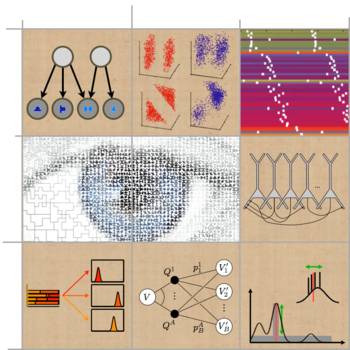
The brain has a remarkable capacity to learn continuously about the environment and to use this knowledge flexibly to make predictions and guide its future decisions. Our group studies learning and memory from computational, algorithmic/representational and neurobiological viewpoints. We also maintain an active interest in the possible computational functions of neural oscillations, particularly those present in the hippocampus and neocortex.
Computationally and algorithmically, we use ideas from Bayesian approaches to statistical inference and reinforcement learning to characterize the goals and mechanisms of learning in terms of normative principles and behavioral results. We also perform dynamical systems analyses of reduced biophysical models to understand the mapping of these mechanisms into cellular and network models.
We collaborate very closely with experimental neuroscience groups, doing in vitro intracellular recordings, multi-unit recordings in behaving animals, and human psychophysical and fMRI experiments.